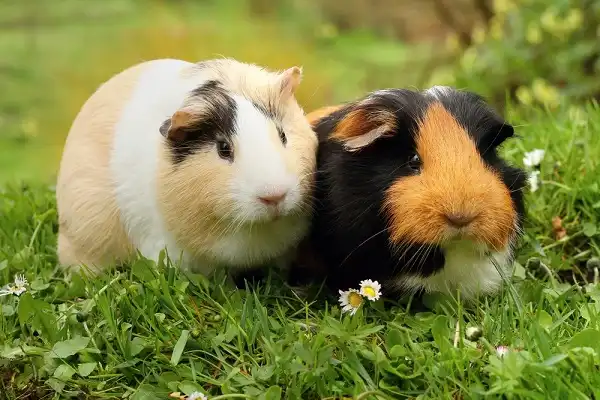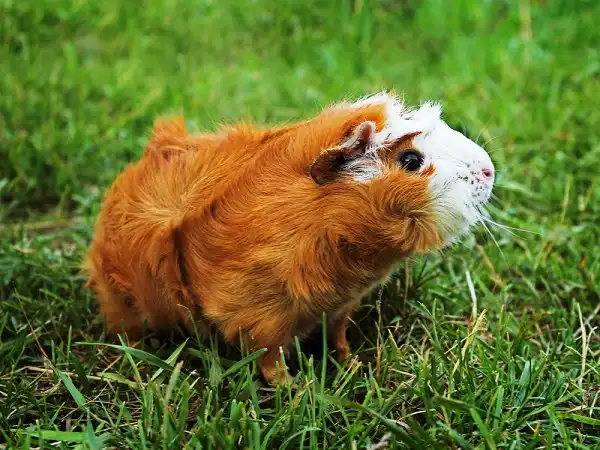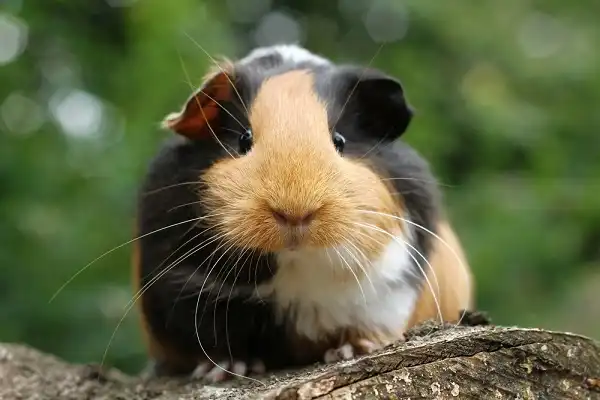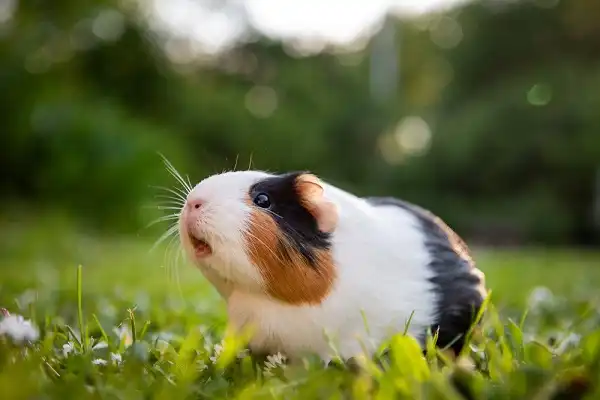Guinea pigs are one of the most beloved pet options for people of all ages, especially due to their gentle nature and friendly dispositions. From babies to adults, these small rodents can provide hours of entertainment as they hop around and cuddle up next to their owners. Whether you’re considering adopting your first guinea pig or need some advice on how to give your current pet the best possible care, this blog post is designed with you in mind. Here you’ll learn about everything from picking out the right breed for your family’s needs, providing quality nutrition and health care, understanding them through body language (which goes a long way!), tips for playtime fun – even introducing a new hairy friend into a multi-pet household situation. Keep reading if you want to know more about these fluffy little friends!

Guinea Pig Description
The guinea pig (also known as the cavy) is a small mammal that is part of the rodent family. Guinea pigs are native to South America, where they have been domesticated for over 3,000 years and bred into many different breeds including English shorthaired, Abyssinian, Teddy bear, and Peruvian. They have short fur coats that come in a variety of colors such as white, black, brown, and red. Guinea pigs make great pets due to their calm nature and docile personality. They love spending time with people and will quickly become attached to their owners – making them great companions. They are also social animals, so it’s best to adopt two for a happier and healthier pet.
Guinea Pig Habitat
Guinea pigs require a habitat that is large enough for them to move around and explore comfortably, as well as provide ample space for toys, treats, and activities. An ideal habitat should include plenty of hiding spaces, such as tunnels, tubes, and boxes. The cage should also have multiple levels – either built-in shelves or ramps – allowing your guinea pig to easily travel up and down different levels. For bedding material, make sure to use materials specifically made for guinea pigs. Avoid using wood shavings or sawdust as they may cause respiratory problems due to their small size. Choose bedding that is safe and absorbent such as shredded paper or straw-based products. Additionally, be sure to change the bedding regularly in order to keep it clean and free from odor-causing bacteria. When decorating the habitat make sure to include chewable items such as hay cubes or pieces of wood to keep your pet stimulated and entertained – this will help prevent boredom which can lead to destructive behaviors. If you plan on housebreaking your guinea pig it is important that the habitat has a designated potty area that consists of a litter box filled with hay or paper-based litter; this will help minimize messes around the home.
Guinea Pig Diet
Guinea pigs require a diet that is rich in nutrients and vitamins, as well as low in sugar and fat. They should be fed fresh vegetables such as carrots, celery, kale, bell peppers, squash, and lettuce every day. Dark green leafy vegetables such as spinach, collard greens, and dandelion are especially good for guinea pigs due to their high vitamin C content. Fruits can also be given to your guinea pig occasionally as treats; however, it is important to keep the fruit intake at a minimum since they contain high amounts of sugar which can lead to obesity. Apples and pears are great options for providing your pet with a sweet treat while still keeping the sugar levels low. In addition to fresh vegetables and fruits, hay should also be included in your guinea pig’s daily diet. Hay provides a source of fiber which helps with digestion and prevents hairballs from forming in the digestive tract. Timothy hay is the most popular type of hay for guinea pigs due to its high nutrient content; other types such as oat hay or Bermuda grass hay can also be offered but should not replace Timothy hay altogether.

Guinea Pig Size
Guinea pigs come in a variety of sizes, ranging from small to large. The average size of a full-grown guinea pig is around 8-9 inches long, but some can reach lengths as long as 12 inches or more. In terms of weight, an adult guinea pig typically weighs between 1.5 and 2 pounds, although larger breeds may weigh up to 3-4 pounds. The size of a guinea pig can vary depending on its breed and sex; while female guinea pigs tend to be smaller than males, certain breeds (such as the American chinchilla) can be larger than others. Additionally, diet and lifestyle also play an important role in determining the size of your pet – those who are well-fed and exercised regularly tend to be larger than those that are not. Guinea pigs have short legs and feet which allow them to easily maneuver through narrow tunnels or pathways. They are able to change directions quickly while running thanks to their flexible spine which helps them make sharp turns. Guinea pigs also have curved claws that help them grip surfaces when climbing or jumping onto higher ledges; this is especially helpful for navigating multi-level habitats!
Guinea Pig Lifespan
The average lifespan of a guinea pig is 5-8 years, although some can live up to 10 years or more with proper care. The key to keeping your pet healthy and extending its life is providing it with a nutritious diet, regular exercise, and plenty of love and attention. Additionally, guinea pigs need to stay active by having access to a large habitat where they can roam around freely. Providing your pet with mental stimulation through interactive toys will also help it stay active and healthy for longer. One important thing to keep in mind when caring for your guinea pig is that they are social animals and thrive on interaction with their owners. Spending time playing with them or giving them gentle pets can go a long way in making them feel loved and secure! Additionally, it’s important to make sure that the environment they are living in is clean and free of any hazards that may threaten their safety.
Guinea Pig Behavior
Guinea pigs are social animals that enjoy the company of humans, as well as other guinea pigs. When kept in pairs or groups they tend to form strong bonds and will often groom each other, share food and snuggle up together when sleeping. When it comes to their behavior, guinea pigs are quite independent creatures who like to explore and express themselves. They typically have unique personalities which can range from shy to outgoing – knowing your pet’s individual character traits can help you better understand its needs and keep it happy! In terms of communication, guinea pigs use a variety of vocal noises such as squeaks, chirps, and purrs to communicate with one another or show excitement. Additionally, they use body language to express their emotions – for example, when scared they may hunch up or run away, and when happy they may jump around and squeak. Overall, guinea pigs are intelligent creatures that can be taught basic tricks such as coming when called or following a path.

Guinea Pig Speed
Guinea pigs are surprisingly speedy creatures and can reach speeds of up to 10mph in short bursts. They are naturally fast runners and adept climbers, using their front paws to help them gain purchase on steep surfaces. What’s more, guinea pigs have a natural ability to sense danger, which typically triggers an increased speed of movement as they attempt to flee from the perceived threat. When given ample space, guinea pigs can exercise by running around for several minutes at a time. This helps keep them healthy and fit but also provides them with an outlet for releasing pent-up energy. Additionally, regular exercise helps ensure that your guinea pig’s muscles stay strong and flexible – allowing it to maintain its high speed over long distances if necessary. However, while guinea pigs’ speed is impressive, they are easily exhausted and should not be allowed to exercise for more than 30 minutes at a time in order to avoid overexertion. Furthermore, because of their small stature, guinea pigs need softer surfaces to run on in order to prevent injury or joint pain.
Guinea Pig Hunting
Although domesticated guinea pigs are not typically known for their hunting skills, they display natural behaviors that may be misconstrued as predatory behavior. For example, when encountering other animals such as cats or rabbits, your pet guinea pig may take an interest in them and attempt to chase them away. When it comes to insects and other small creatures, guinea pigs can often outmaneuver their prey with speed and agility. With a combination of quick reflexes and sharp claws, they can sometimes catch unsuspecting beetles or moths in mid-air! This type of behavior should generally be discouraged because even if the prey is non-toxic to your pet, it could still contain parasites or bacteria which could potentially harm it. Another type of hunting behavior that is usually seen in adult guinea pigs is the practice of digging and foraging for food. This is a natural instinct that helps them find grass, roots, and other edible items to eat from the ground below – another great source of nutrition for their diet. Overall, your pet guinea pig may display some hunting behaviors but should not be encouraged to do so as it could lead to health problems or even injury. Instead, provide your pet with a well-balanced diet and plenty of physical activity such as running and climbing to keep it healthy and happy!

Conclusion
Guinea pigs are great small pets that can provide a unique and fun experience for people of all ages. With their impressive speed capabilities, natural curiosity, and ability to sense danger, guinea pigs make excellent companions who will quickly become part of the family. Additionally, they enjoy physical activities such as running, climbing, and digging which helps to keep them healthy and fit. However, it’s important to note that although guinea pigs may display some hunting behaviors, it is not advised to encourage this type of behavior as it could potentially lead to health problems or even injury. By providing your pet with proper nutrition and lots of love and attention you can help ensure your furry friend stays happy and healthy for years to come! So if you’re looking for an active and fun pet, the guinea pig may be just the companion for you!
Frequently Asked Question


